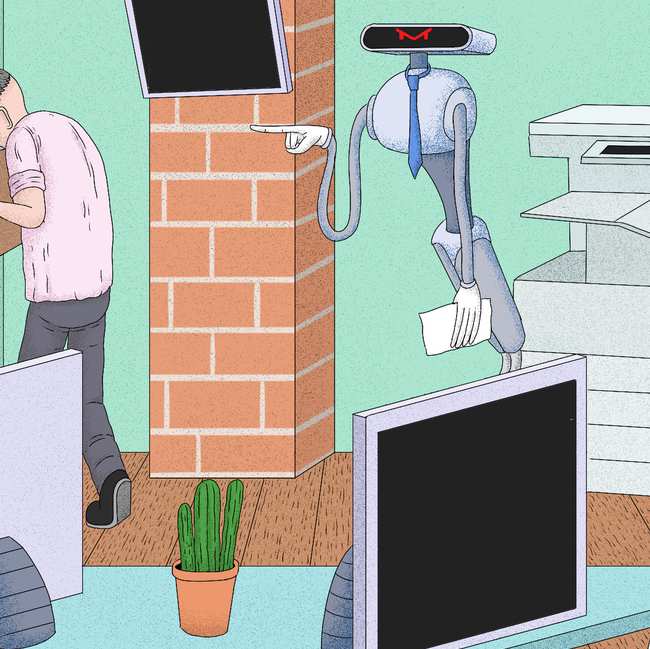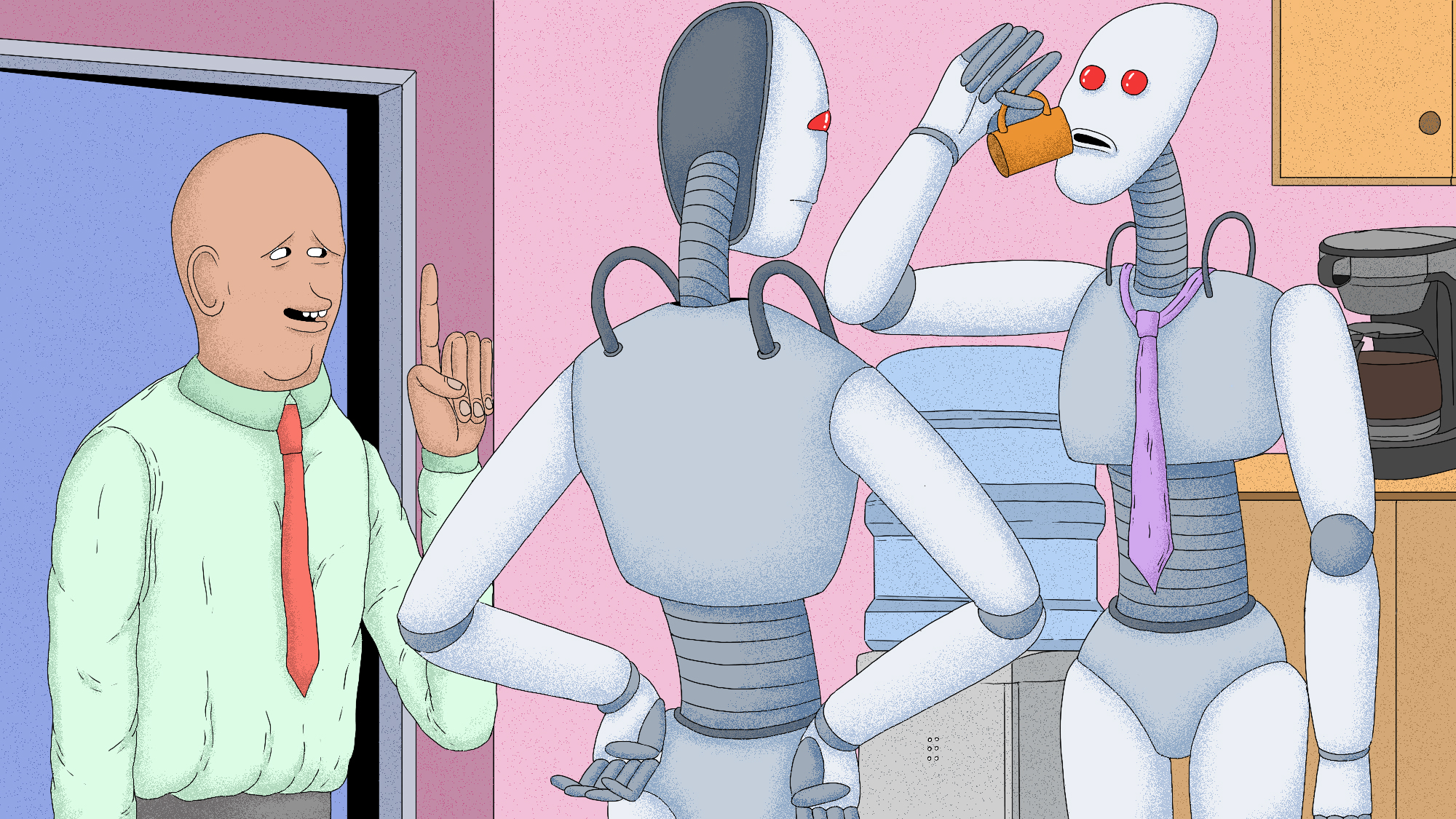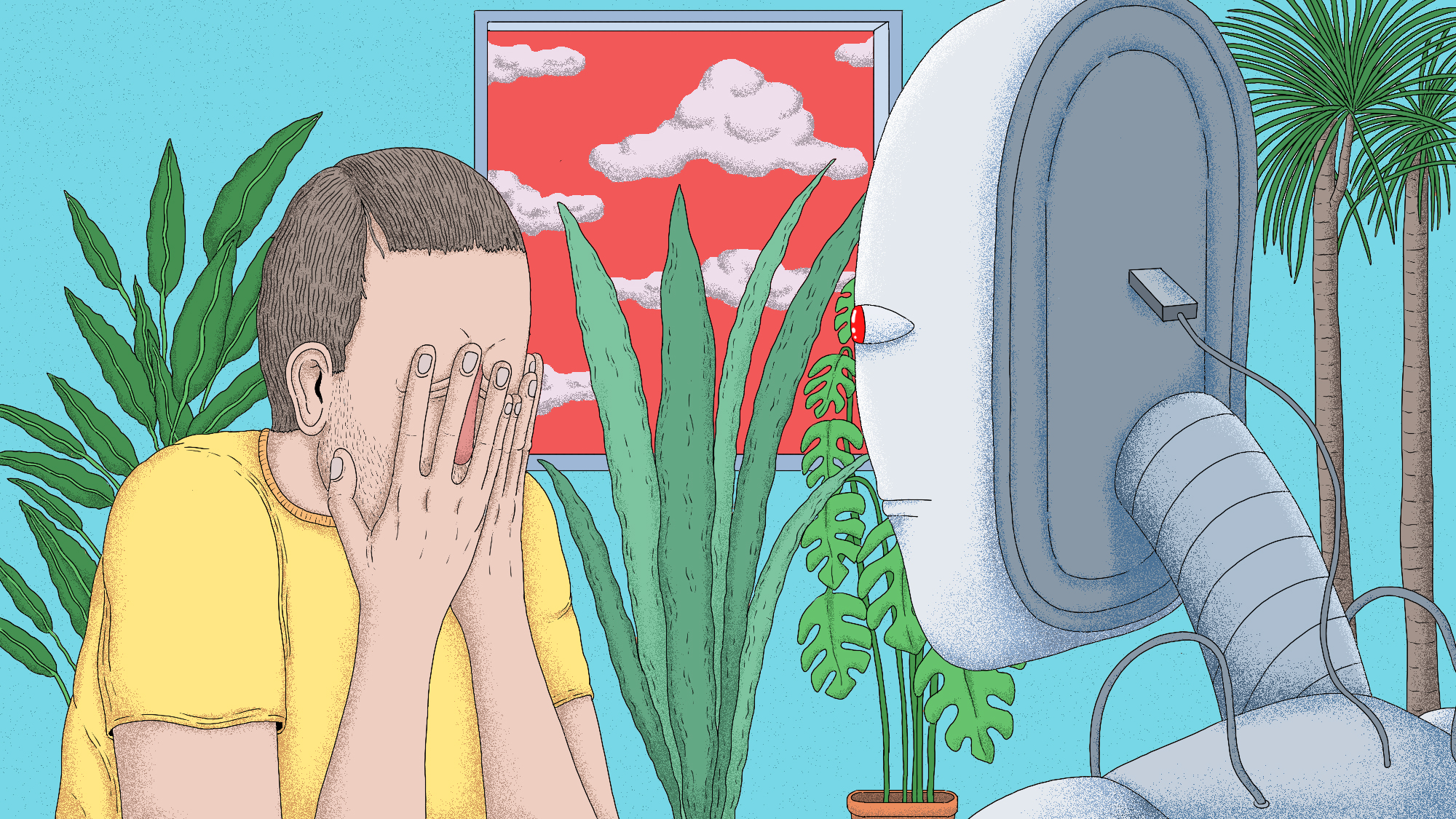Experts believe that almost a third of the global workforce will be automated by 2030. But are universities preparing students for the rise of the office machines?
Had you popped into the equity trading floor at Goldman Sachs' New York headquarters in 2000, you would have walked into a bloodbath of the senses: 500 men and women projectile swearing, phones blaring, the dizzying aroma of adrenaline oozing from every human orifice. These days, you might just make out the lifeless whir of 200 high-speed servers over the ticking clock. Because those 500 people have been whittled down to three. The other 497 have been usurped by complex algorithms.
These were not working stiffs: cleaners, receptionists or other service-industry hirelings already humbled by computers. They were university graduates with hard-fought degrees in subjects like business, finance or economics. Trouble was, for all their brainpower, passion and pedigree, algorithms just did the job better. They aren't the only victims. The computers, now, have caught the scent of blood.
"A lot of people assume automation is only going to affect blue-collar people, and that so long as you go to university you will be immune to that," says Martin Ford, author of Rise of the Robots: Technology and the Threat of a Jobless Future. "But that's not true, there will be a much broader impact."
This raises the question: as we move toward the brave new automated world, is a university degree in, say, economics, philosophy, English or anything else that isn't to do with fixing cobots (collaborative robots) or writing algorithms worth the PDF file it was exported on? Or is it, practically speaking, useless? And if so, what are universities doing about it?
"Most universities are simply not doing enough to prepare students for the automated workforce," says Nancy W Gleason, PhD, director of the Centre for Teaching and Learning at Singapore's Yale-NUS College, and the author ofHigher Education: Preparation for the Fourth Industrial Revolution. "We need to teach students to be cognitively flexible, to have the skills and confidence to try different jobs throughout their lives. In the gig economy, you're not going to have seven employers, you're going to have seven careers. People might say, 'Oh my degree in history didn't do me any good.' Well, guess what, neither will a degree in radiology, dentistry or law."
This is not a joke. Last year, a report by McKinsey Global Institute suggested that up to 800 million careers (or 30 percent of the global job force) – from doctors to accountants, lawyers to journalists – will be lost to computers by 2030, while every single worker on earth will need to adapt "as their occupations evolve alongside increasingly capable machines". Others suggest this number may be as high as 50 percent. "Machines are taking on cognitive capability, beginning to compete with our ability to reason, to make decisions and, most importantly, to learn," adds Ford. "At least over the next couple of decades, AI and robotics are going to eliminate huge amounts of jobs. Beyond that, it gets more unpredictable; we really don't know what's going to happen."
*
To find out more, I contacted 25 of the world's leading universities to ask what, if anything, they are doing to prepare students for the choppy waters of fluid work. Of America's eight Ivy League schools, only Dartmouth College had something to say; the rest either did not reply, were too busy or couldn't find the proper person for me to speak to. And of the eight UK universities I approached, the London School of Economics and University of Sheffield did not reply, while Leeds and Birmingham both couldn't find anyone suitable to comment. A press officer for the University of Cambridge said she wasn't "aware of anything Cambridge-specific".
Oxford, Bristol, Manchester and City, University of London, however, all got back to me. "Next year, we'll be introducing an interdisciplinary course unit that all of our undergraduates can take, and which looks at exactly this issue," said Caroline Jay, PhD, a senior lecturer in computer science at the University of Manchester.
According to its overview, the course, called AI: Robot Overlord, Replacement or Colleague?, aims to "equip Manchester graduates from all disciplines with an understanding of the impact this technology currently has, the way this is likely to change in the future and, crucially, the ability to grasp the opportunities it brings, whatever your chosen career."
"The whole point of universities is to equip people with the skills to learn," adds Jay. "Students are not just here to learn a set of facts, but to learn how things change, evolve and how they can fit into that future."
The University of Bristol takes a broader view. "If the economy is becoming more of a gig economy, preparing students to become entrepreneurial is something we take very seriously," says Dave Jarman of the university's Centre for Innovation and Entrepreneurship.
So the university has built Bristol Futures, a new initiative that offers a range of open online courses designed to provide "the opportunity for the development of core academic skills and key personal attributes to help students become adaptable, successful graduates". The courses currently offered – Innovation and Enterprise, Global Citizenship and Sustainable Futures – are not degrees per se, but run alongside a student's chosen subject.
"This is our long game," says Jarman. "We're looking at how we smuggle those ideas into anything from classics to chemistry. Of course, sometimes changing practice in a university is like turning round an oil tanker in a phone box, but we're in that process."
Dirk Erfurth, the careers service director at the University of Munich (LMU), in Germany, agrees. "You cannot expect every professor in every faculty to take these issues as their most serious concerns. That is not their task. It is our task in the careers service, as the bridge between the labour market and the academic world."
He says LMU offers funded overseas internships, mentoring programmes and holiday-season mini-courses (€95 (£85) for 40 hours of class time) in subjects like presentation and rhetoric, leadership, time management and communication, and conflict management, as well as a "professional education unit" for former students looking for a skills bump. Erfurth says LMU takes students' future employability very seriously, as long as the students are prepared to play the game.
"This is not about grades or certificates," he adds. "We want to show students that, if you invest a little bit of time and money in your skills, wonderful things can happen to you. You have to leave your comfort zone and go out into the world, to distinguish yourself from others, take internships, develop your open-mindedness, creative thinking, curiosity, networking and entrepreneurial spirit. Those are the skills that will make you employable in the future." This is what the University of Copenhagen calls an "interdisciplinary skills profile".
"We aim to improve students' opportunities to exploit the potential of digitalisation and big data both across the university and with our collaborated partners," says the university's vice-provost, Anni Søborg, echoing much of what I've already heard. "And we make explicit how programmes can be applied in the job market, including a focus on initiatives that ensure students have the requisite skills for innovation and entrepreneurship."
And so, over to America, which Dr Gleason says is "doing very little in higher education relative to other countries". "The truth is, we don't actually know all the jobs we are preparing students for," says Dartmouth's associate dean for the sciences, Dan Rockmore. "Dartmouth is the premier liberal arts university in the world. The liberal arts ethos is that a well-rounded and broad education, an exposure to the multidimensional nature of the great challenges of our day, are what prepares a mind for the unpredictable challenges of the world post-graduation. We aim to teach critical thinking, habits of mind that can be brought to bear in many different contexts."
He then pointed to the Dartmouth Entrepreneurial Network, which gives students "the opportunity to try out ideas for and in the 'new economy'", along with its "flexible quarter" system that gives students the "opportunity to experience the workplaces of the new economy" all year round. "In short, a Dartmouth education will prepare students to take advantage of those [technological] transformations."
The key point here is that all these courses are optional. No students are forced to take them, and they offer no future-proofing guarantees. But then, is it really a university's responsibility to hold students' hands throughout their lives? Or is it, really, up to students?
"I would say this is like a gym membership, not a butler," says Jarman. "You don't pay your money and the goods turn up. You pay for an opportunity, but you've got to go in and lift the weights and run the distance. If you do those things, universities have got amazing facilities and people that can help you accelerate that process. But it doesn’t land on a plate."
University students – as Jonathan Black, the director of university career services at Oxford University, is keen to point out – are adults after all. "One of the things Oxford, and other universities, endeavour to do is to persuade people who are perfectly bright enough to benefit from a university education to consider our many extracurricular services, such as the careers department, student societies, volunteering or work experience in the summer. That's where they're going to get that experience, but they’ve got to realise they're getting it."
He went on: "But we're not going to tell students what to do. I think we'd be doing students a disservice if we hold their hand all the way until the end and then say, 'Here's your job.' We're here to lay the table, show students what's available, but it's up to them to decide if they want to eat."
The truth is, what keeps most university presidents up at night is not the robocalypse, but shorter-term threats to their survival, like competing for endowments and enrolment. But there is one university president whose dreamsare overrun by robots. That, Joseph E Aoun says, is his advantage: robots cannot dream. The president of Northeastern University (NU) in Boston has developed a strategy to fight back. He calls it "humanics".
"If robots are going to replace human beings in the workplace, then we need to become robot-proof," he says. "The rise of extraordinary artificial intelligence requires us to cultivate extraordinary human intelligence. Even today's most brilliant machines still have limitations. Machines do not yet have a capacity for creativity, innovation or inspiration."
His idea, essentially, is to give students the ability to solve the world's most urgent issues in a way that robots cannot – with empathy. Or, as he puts it: "I've not yet seen a computer cry."
Laid out in his book, Robot-Proof: Higher Education in the Age of Artificial Intelligence, humanics has become a staple of Northeastern’s programme that requires computer science majors to, say, take side classes in theatre or improvisation. "Why? Because it allows them to start interacting with others, which is a simplistic but vital example of getting people to go beyond what they’re studying," he says. "Human interaction is going to be a vital skill in the future."
Aoun argues that the only way to create a curriculum for a "robot-proof" education is by fostering "purposeful integration of technical literacies, such as coding and data literacy, with human literacies, such as creativity, ethics, cultural agility and entrepreneurship".
But, he says, experiential learning is also essential, and so has developed an acclaimed co-operative education and career-development programme called Co-op at NU. "We have a network of 3,000 employers in 136 countries on all continents, including Antarctica, where the students apply for paid jobs for six months," he says. "There, they get the unique opportunity to learn how people interact in the workplace, what opportunities look like, what it's like to work in a different cultural setting; they start understanding themselves better. That is powerful and transformational."
The numbers speak for themselves: most students do two or three co-ops throughout their college years, and 92 percent of them find full-time work within nine months of graduating.
*
The flood of automation is coming. But Aoun and Gleason say simply teaching students to swim – as the handful of universities I spoke to are beginning to do – will not save them from drowning eventually. Instead, they agree, we need to build an arc. "We must move away from the idea of a university degree being front-loaded in the first 18 to 24 years of your life," says Gleason. "Instead of a three- to four-year model, students should be admitted for 20 years with the ability to come back and take classes for free whenever they want."
That is exactly what both NU and NUS, where Gleason works, are doing. NUS, for example, has launched two government-supported "lifelong learning institutes", where graduates can return at any stage of life to "upskill" in hundreds of courses – long and short – from psychology to Arabic, "business agility" to "cyber security for the internet of things". "We are looking at stacking courses together to re-skill adults," Gleason says. "It's a long road ahead, but the real low-lying fruit is more experiential learning, and less lectures."
As for NU, Aoun has overseen the establishment of a lifetime-learning network of campuses in Charlotte, North Carolina, Seattle, Silicon Valley, Toronto and San Francisco, where members can return to learn new skills. "Seventy-four percent of the population are what we call 'non-professional learners'," he says. "Ignore them and universities will become irrelevant. If we don't step in and integrate lifelong learning as part of our core mission, we become like the railway industry that saw the onset of the airline revolution and said, 'This is nothing to do with us.' They didn't see themselves in the transportation business, and their business suffered as a result."
None of this, of course, comes cheap. NUS and NU are both well-funded institutions. Gleason suggests a tax on robots would cover it. If not, industry needs to step up and cough up. "I don't see why industry shouldn't," she adds. "It's not like they won't be profiting from some of the jobs that go away."
So what, in the meantime, can students who don't go to NUS or NU – or one of the world's few other universities with similar ideas – do to future-proof their careers? The answer, really, is to become as human as humanly possible. We need to fight back with feelings. "The future labour market needs not content experts or information processors," says Gleason, "but creators, analysers, problem solvers, collaborators and lifelong learners who are able to acquire new skills as old ones quickly become obsolete. The best place you can learn those skills are in the liberal arts."
Maybe, as a start then, that degree in philosophy or English isn't such a bad idea after all.



